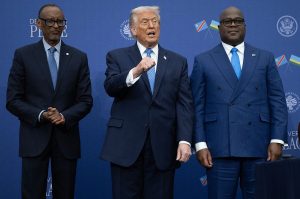Some say the Roman Republic died when the Senate murdered Tiberius Gracchus, a populist reformer. When the elites whose negligence and hubris had fueled in the first place the rise to prominence of Tiberius and his brother, Gaius, chose violence over the political process, they peeled away any pretense of civility with the ruled.
Something similar happened with Donald Trump. His presidential record is a mixture of half-truths and half-measures. He was too soft and too undisciplined for all the bluster about him as a competent threat to the established political order. He did, however, help reveal the true face of the regime as it attempted to snuff him out.
In February, TIME ran a story about the ‘shadow campaign’ that altered the course of the 2020 election. Left-wing activists, corporations, and the AFL-CIO hatched a ‘conspiracy’ to ensure Trump’s electoral demise. The right saw this as proof that the ‘Deep State’ is real. The left said: it is real — and it is good because it is on our side.
Trump certainly didn’t make it hard to lose with the campaign he ran. Nearly a billion in campaign cash went missing while ad buys receded from contested states — some of which were ultimately lost. Nevertheless, from the beginning to the end of his presidency, Trump’s mere existence sent the incumbent regime and its allies into such powerful spasms that the masks could not but fall from their faces.
The best thing he could have done after leaving the White House would have been cultivating and endorsing leaders capable of carrying forward the 2016 mandate. Instead, Trump is on an island somewhere between fantasy and figurehead, between once and future president.
Trump, in exile, we have been told, broods for revolution over the waters at Elba, using his influence to prepare the environment for his return. The truth is that he has allowed his relevance to become connected to his ability to serve the GOP’s interests, whether he realizes it or not.
It’s easier to track his good endorsements over the bad ones because there are so many of the latter and so few of the former. They generally align with the interests of the GOP establishment he claims to rail against.
His post-presidency inner circle largely consists of the worst White House and campaign staffers, from Bill Stepien to Brad Parscale — two men at the center of campaign finance troubles. The latter was also instrumental in putting together a team for the Boschian nightmare that is the gubernatorial Jenner candidacy in California. It includes Tony Fabrizio, the top pollster on Trump’s two campaigns, and Steven Cheung, a former Trump White House and campaign communications aide. After Trump’s team helped launch Jenner’s campaign, the candidate announced support for amnesty and said boys who transition ‘very young‘ should be allowed to compete in women’s sports.
This spectacle raised a good question: whether Trump’s influence diminishing wouldn’t be a bad thing for the movement he started, considering he has moved it left on some cultural issues.
After months of hype, the former president’s short-lived blog, ‘From the Desk of Donald J. Trump’, vanished from the web. It ‘will not be returning’, senior aide Jason Miller told CNBC. Before the platform flickered on and off, at the behest of Jared Kushner, Trump turned down using alternative social media sites Parler and Gab after Twitter suspended his account. In exchange for his presence on either platform, his team reportedly wanted an ownership stake in Parler and equity in Gab. Talks collapsed in both cases.
He reopened this scab by taking a shot at Twitter and Facebook after Nigeria banned the former this month for deleting a tweet by President Muhammadu Buhari. ‘Perhaps I should have done it while I was president,’ he wrote in a statement. ‘But Zuckerberg kept calling me and coming to the White House for dinner telling me how great I was.’
In other words, despite all the grievances held by his own constituents for Facebook, Trump let Zuckerberg off easy due to his flattery and ultimately allowed himself to be marginalized by his enemies. For now, his online presence depends on other Republicans keeping his name and brand alive for their own interests on social media.
Most recently, award-winning journalist Sharri Markson revealed that Trump allowed advisers to talk him out of launching an investigation into the origins of COVID-19 and taking measures to hold China accountable.
Trump, Markson wrote, ‘wanted to haul Dr Anthony Fauci in front of a presidential commission to give evidence about funding the Wuhan laboratory suspected of leaking COVID-19’. There were plans for the special presidential panel, ‘with an executive order even drawn up to hold China and its collaborators accountable and tally a reparations bill to fire off to Beijing’.
Larry Kudlow, who served as the director of the National Economic Council under Trump, is implicated in Markson’s story as one of the advisers who successfully turned Trump away from confronting Fauci and China. Trump shows no sign of breaking with Kudlow. Many people in that camp — call them ‘business conservatives’ — have gone on with Trump’s blessing to influence the ‘MAGA’ agenda at the America First Policy Institute, which Jared Kushner and Ivanka Trump are advising.
The most recent indicator that Trump’s influence is dependent on his ability to serve establishment interests is illustrated by his teaming-up with Newt Gingrich for a reboot of the ‘Contract With America’.
The conditions conducive to Gingrich’s success in 1994 no longer exist. More to the point, Gingrich has recruited Mark Meadows and Sen. Lindsey Graham into the cause, which is essentially just a serving of tax-cuts conservatism with vague, empty culture-war calories — or the opposite of what won Trump the White House.
Trump could use his influence to course-correct the movement that began with a Gracchean mandate given to him by Americans in 2016. But all along that road are roadblocks of ego and interests, and it seems we’re all just left waiting for Caesar.

























